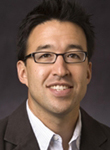Matsudaira named to White House Council of Economic Advisers
By Ted Boscia

Cornell labor economist Jordan Matsudaira has been appointed a senior economist at the Council of Economic Advisers (CEA), President Barack Obama’s primary source of objective research and recommendations on domestic and international fiscal policy.
Matsudaira, who will begin his one-year term in Washington, D.C., Aug. 1, will provide data analysis and policy advice mainly on education, labor and immigration issues. He also expects to oversee the chapter on human capital issues in next year’s Economic Report of the President, the administration’s annual statement on the nation’s fiscal health, including policy ideas for major economic challenges.
“I anticipate spending time working on White House policy and crafting regulations related to higher education finance reform, the president’s early childhood education initiative, strategies toward increasing work among the long-term unemployed, raising the minimum wage and the immigration bill now working its way through Congress,” said Matsudaira, assistant professor of policy analysis and management in the College of Human Ecology.
At Cornell, Matsudaira has focused largely on studying health, education and employment programs and policies designed to boost the prosperity of poor and vulnerable populations. He has examined, for example, the effectiveness of bilingual education programs for the children of immigrants, optimal caregiver staffing levels in nursing homes and state policies to raise employment following federal welfare reform.
Established by Congress in 1946, the CEA is an executive agency that monitors economic developments and trends, evaluates federal fiscal programs and policy and offers research-based recommendations to the president on economic matters. Matsudaira will join a team of some 20 academic economists at the CEA.
“As someone who was drawn to economics and public policy as a way to think hard about how government policies can improve the well-being of the poor and other disadvantaged groups, conducting academic research often feels like taking Pascal’s Wager: You work hard to do high-quality work to uncover ‘the truth,’ but usually have to take it on faith that the knowledge you produce will have a real impact on the world,” Matsudaira said. “I’m excited by the chance to have a direct impact on policy, or at least to learn about what it takes to have that impact to inform my work.”
Ted Boscia is assistant director of communications for the College of Human Ecology.
Media Contact
Get Cornell news delivered right to your inbox.
Subscribe